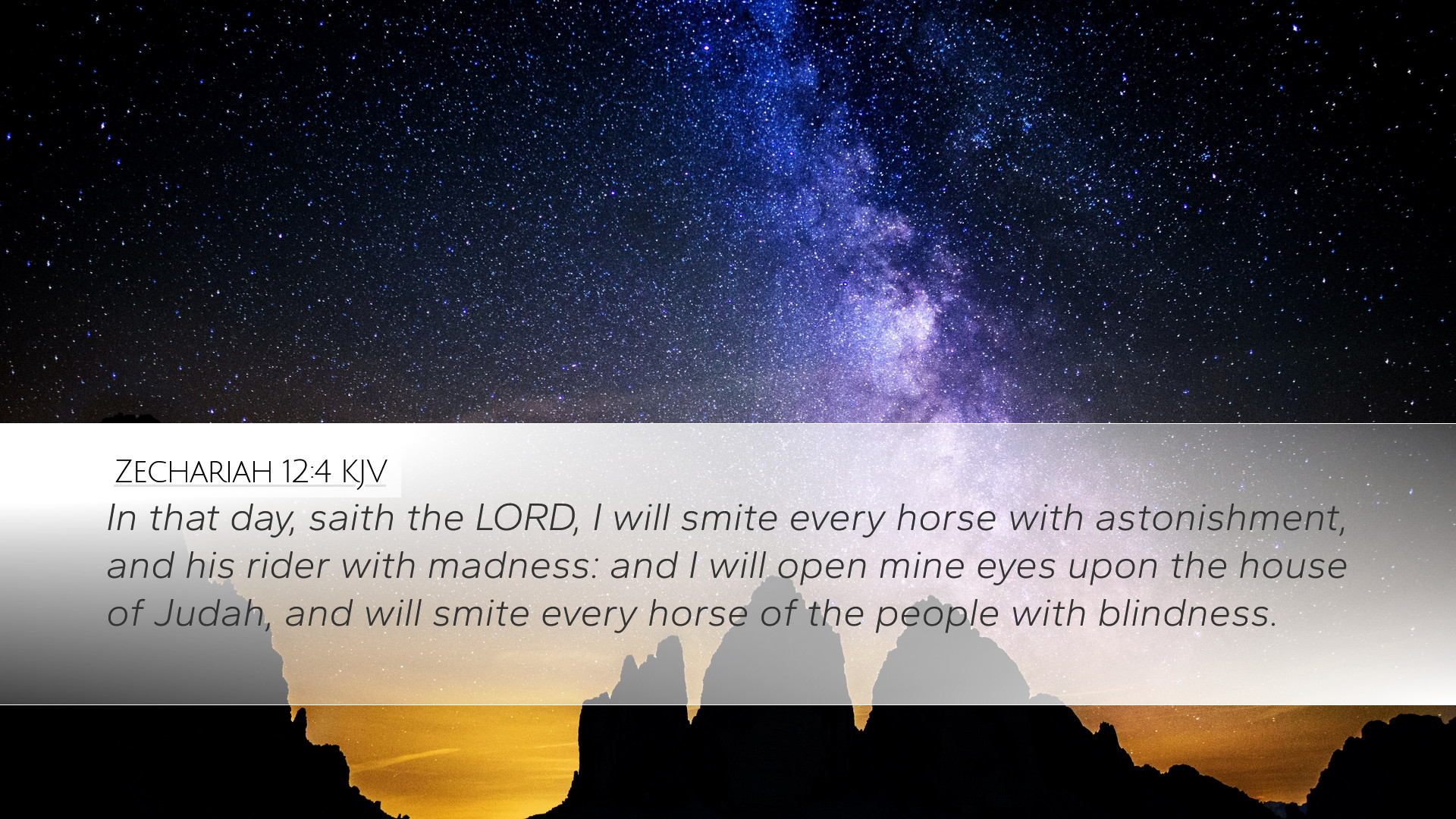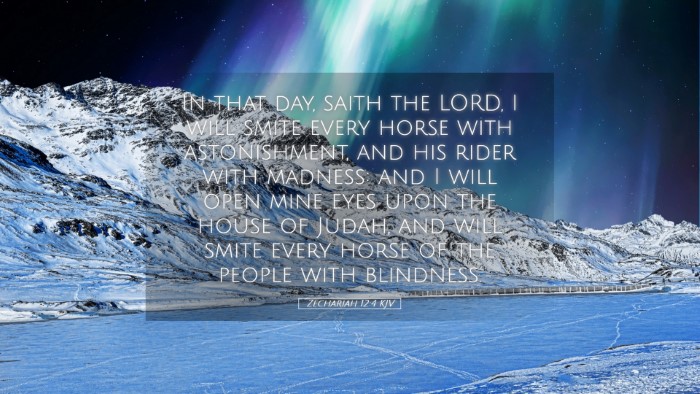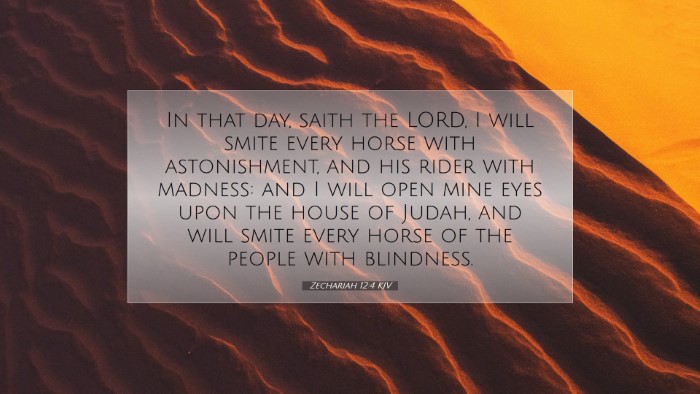Old Testament
Genesis Exodus Leviticus Numbers Deuteronomy Joshua Judges Ruth 1 Samuel 2 Samuel 1 Kings 2 Kings 1 Chronicles 2 Chronicles Ezra Nehemiah Esther Job Psalms Proverbs Ecclesiastes Song of Solomon Isaiah Jeremiah Lamentations Ezekiel Daniel Hosea Joel Amos Obadiah Jonah Micah Nahum Habakkuk Zephaniah Haggai Zechariah MalachiZechariah 12:4
Zechariah 12:4 KJV
In that day, saith the LORD, I will smite every horse with astonishment, and his rider with madness: and I will open mine eyes upon the house of Judah, and will smite every horse of the people with blindness.
Zechariah 12:4 Bible Commentary
Commentary on Zechariah 12:4
Verse Text: "In that day," declares the LORD, "I will strike every horse with panic and its rider with madness," says the LORD; "but for the sake of the house of Judah, I will keep my eyes open when they cry to me." (Zechariah 12:4, ESV)
Introduction
The book of Zechariah is rich in prophetic imagery and reflects a significant period in Israel's history. This verse, Zechariah 12:4, is a critical declaration concerning God's protective hand over Judah amid turmoil and conflict. Commentaries by Matthew Henry, Albert Barnes, and Adam Clarke shed light on the depth of this prophetic promise, its implications for God’s people, and its fulfillment in the New Testament context.
Contextual Analysis
This verse is situated within a context where God reassures His people of His care and vigilance. Zechariah prophesies about the coming day of the Lord, a time where divine intervention is pivotal for the restoration and deliverance of Judah.
-
Historical Context:
This prophecy likely addresses the fears of the returned exiles who faced opposition and threats from surrounding nations. Understanding this backdrop is essential for grasping the intensity of God's promise.
-
Theological Context:
Theologically, this verse underscores God’s sovereignty in the face of chaos and His intimate relationship with His people, assuring them of divine vigilance amidst their adversities.
Key Insights from Public Domain Commentaries
Matthew Henry's Commentary
Henry emphasizes the divine intervention promised to Judah. He notes how the imagery of panic among horses and madness among riders indicates the complete disruption of the enemy’s plans. He elaborates that this reflects God’s might and willingness to protect His chosen people.
Henry observes that the mention of "every horse" signifies that all instruments of war and power will be brought to the point of confusion. This aligns with God's overarching strategy of safeguarding His people, showing that no earthly power can withstand divine authority.
Albert Barnes' Notes on the Bible
Barnes highlights the profound nature of God’s promise, particularly examining the phrase "I will keep my eyes open." This assurance suggests an active and ongoing vigilance rather than passive observation. Barnes asserts that this strengthens the assurance of God's presence with His people in times of distress.
Moreover, he suggests that this prophetic proclamation serves to call the people towards repentance and reliance on God, assuring them that their cries for help are not ignored but actively heeded by the Lord.
Adam Clarke's Commentary
Clarke offers a detailed explanation of the phrase "in that day," referring to the eschatological significance of the prophecy. He interprets this as indicative of both a near fulfillment in the historical context of Israel's return from exile and a future fulfillment in the Messianic age.
He draws attention to God's promise to "keep my eyes open," interpreting this as a profound statement of providence. Clarke elucidates that this reflects God’s attentive care, emphasizing the relational aspect of God’s involvement with His people. He encourages readers to see this promise as a beacon of hope, echoing through ages as God continually watches over His faithful.
Thematic Considerations
From these commentaries, several themes emerge that are vital for understanding Zechariah 12:4:
-
Divine Protection:
The promise of protection in the face of overwhelming odds serves as a notable theme throughout Scripture. This verse reaffirms that God is fully capable of troubling the hearts of the oppressors in favor of His people.
-
Responsive God:
God's attentiveness to the cries of Judah speaks volumes about His nature. The verse reaffirms a personal and responsive relationship that believers can expect, encouraging trust in divine wisdom during prayer.
-
Eschatological Hope:
The prophetic nature of this verse has implications for future hope in God’s ultimate victory over evil, as seen through the lens of New Testament fulfillment in Christ.
Application for Today
The implications of Zechariah 12:4 extend into our contemporary context, reminding us of the continual need for reliance on God amidst chaos and conflict. As pastors, students, theologians, and scholars reflect on this passage, several applications arise:
-
Trust in Divine Power:
Just as God intervened for Judah, modern believers are called to trust in God's sovereign power to effect change in their circumstances.
-
Persistence in Prayer:
God's assurance of attentiveness encourages believers to remain persistent in prayer, trusting that their petitions are seen and heard.
-
Hope in Difficult Times:
The promise of protection can instill hope in individuals facing personal battles, providing reassurance that God is actively engaged in their situation.
Conclusion
Zechariah 12:4 encapsulates the profound relationship between God and His people, highlighting His protective nature and responsiveness to their needs. Through the insights gleaned from historic commentaries, believers are reminded of God's eternal vigilance and commitment to safeguard those who call upon Him. This verse continues to resonate as a source of encouragement and hope, challenging us to place our trust in the unwavering faithfulness of the Lord.


